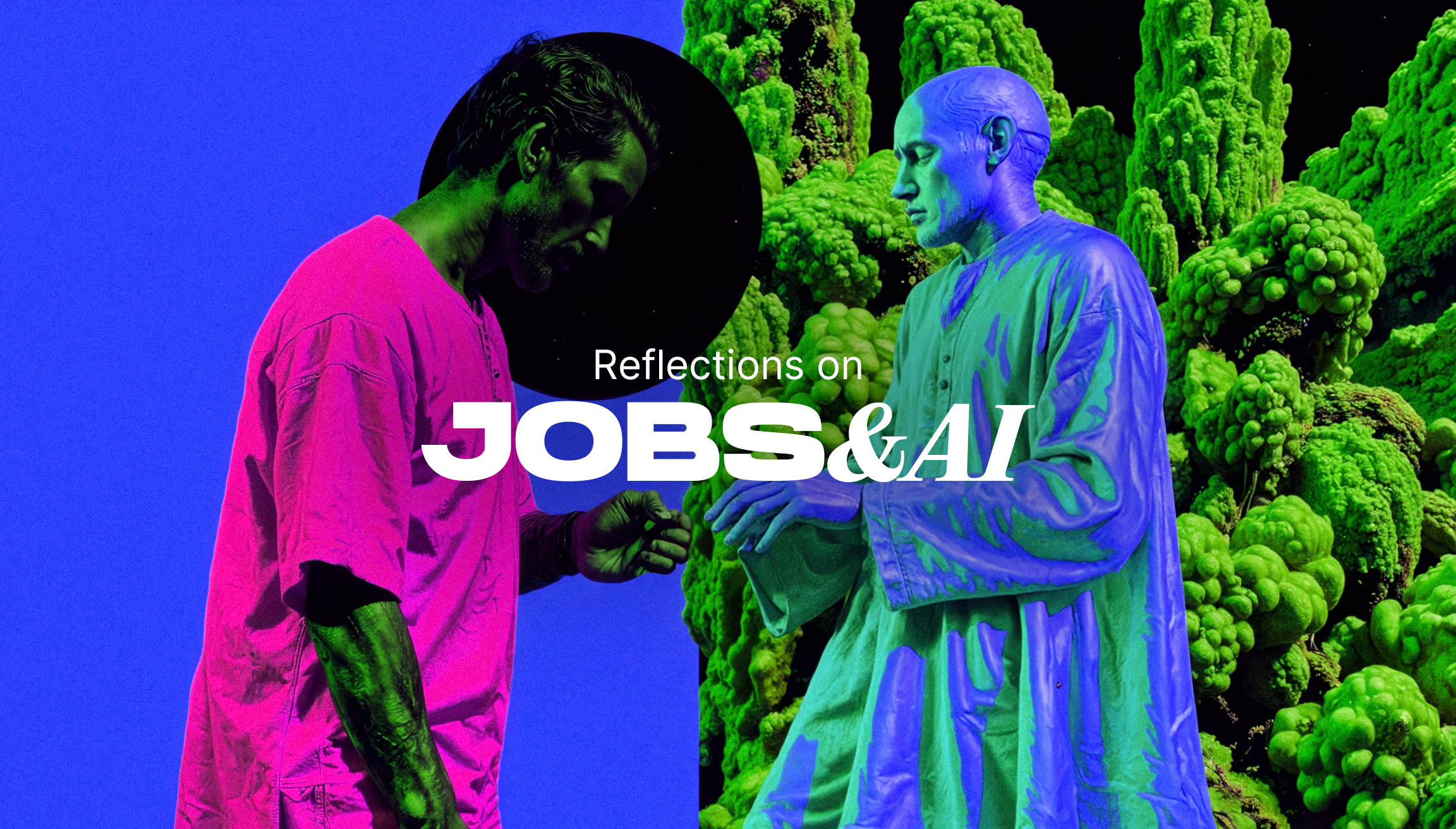
What I believe about Jobs and AI today.

Whenever I give a public speech, one of the first questions from the audience is usually: “Will AI take our jobs?”
As a consequence, I’ve shared my opinion on this many times. That opinion, however, has matured over the years.
Since I’m seeing a lot of buzz again these days about AI replacing our jobs, I felt like doing a summary of my current beliefs.
A job is, at its core, a human using a tool to solve a problem.
That tool can be something we build, something we buy, something we catch (e.g. animal) or something we already own - including our own body.
Calculators, computers, LLMs, and robots are tools.
Humans and their tools run the world. Because we’re so good at creating and wielding them, we outperform ants, dogs, monkeys, and every other species on this planet. The better our tools, the better the work we can do.
This status quo has prevailed since the invention of the wheel, through the printing press, and now to AI. As we move along, our “jobs” change - because our problems have changed.
What is economically relevant evolves as a consequence. The more we can produce something, the more we will use it, and the more we want to produce it (see Jevon’s Paradox).
Hence the work we perform changes with our available technology.
To a medieval farmer, the job description of a “professional YouTuber” might not sound like actual work. Similarly, the role of a medieval “town crier” sounds equally absurd to us today.
With every new technological unlock, two things emerge:
The same is happening today with AI.
Much of yesterday’s work will be enhanced - just like the steam engine enhanced farmers, smiths, and carriage drivers. Almost nobody rides a horse today, and that’s fine.
AI is rewiring what we value, how we speak, and how we think.
The resulting innovation occurs in cycles. Each cycle brings more powerful tool users into the economy and shifts our sense of what’s valuable. New jobs are created to seize new opportunities, more output is produced, and new - and often more complex - problems emerge.
Disruption isn’t an exception; it is the engine of innovation.
In reality, the faster technology evolves, the faster we adapt - and the faster our perception of what constitutes a job worth pursuing shifts.
Consider Jeff Bezos’s famous quote about the levels of jobs: “You can have a job, a career, or a calling.” Depending on the technological context you’re born into, your ambitions - and thus your calling - can vary widely. It can also vary over the course of your own life, once you achieve your goals or need to set new ones.
While people centuries ago dreamed of conquering the Earth, modern humans dream of conquering space and moving up the Kardashev scale.
Some argue that AI as a tool and technology is different because AI can "decide" things. But this assumes AI operates freely and without constraint. In reality, current AI systems remain tightly bound by human-defined inputs, physical hardware, laws, and oversight structures. Saying “AI decides” is like saying a calculator willingly chooses the result of a sum or a book chooses the outcome of a surgery. Unless we intentionally hand it autonomy and remove all oversight, every AI system remains a tool of and for humans - even if a very advanced one.
Tools don’t have agency unless we grant it to them.
The open-minded individual has no reason to fear losing their current job - because new opportunities are emerging just as fast as old jobs disappear. Not all of the new opportunities will be exciting, and many new jobs will eventually feel mundane. But that’s been true for every job, in every era.
We decide how the economy evolves based on the narratives we build around new jobs. Do we focus on the opportunities of technological evolution - or only on the problems?
The steam engine gave us trains and tanks.
Modern physics gave us nuclear reactors and atomic bombs.
AI gives us thinking machines - and... the Terminator?
To manage the problems that arise - real or imagined - new jobs are created. Of course, they’re not the same jobs as yesterday. What is required of humans evolves.
Knowing how to use “Word” or “Excel” was a valuable, even curriculum-worthy skill in the ’90s. Today it’s baseline knowledge for any office job.
As the required skills change, yes - some jobs will vanish faster than others. But new jobs are appearing faster too. The economy is a balancing act.
“Assembly Line Supervisor,” “Air Traffic Controller,” and “Social Media Manager” are all examples of jobs born from specific waves of technological change - none of which could’ve been easily predicted in advance.
“AI Automation Expert,” “Prompt Engineer,” or “AI Avatar Actor” are latest examples of new jobs.
Who knows - maybe the fact that your old desk job is no longer needed will finally inspire you to become a florist and make the physical world more beautiful?
The disappearance of jobs, and the tension between risk and opportunity, isn’t new. It’s happened over and over in very different ways.
Imagine the shock when Europeans learned about the discovery of the Americas - a new continent suddenly dragged into the global economy.
Related to that, I find the movie Apocalypto has an interesting final scene that mirrors how we think about AI today:
But regardless of how you perceive it, new “jobs” will emerge.
And it is our job to create them.